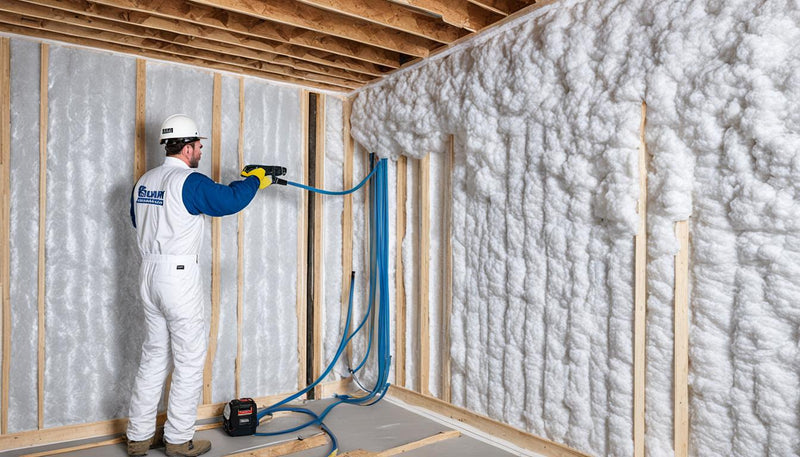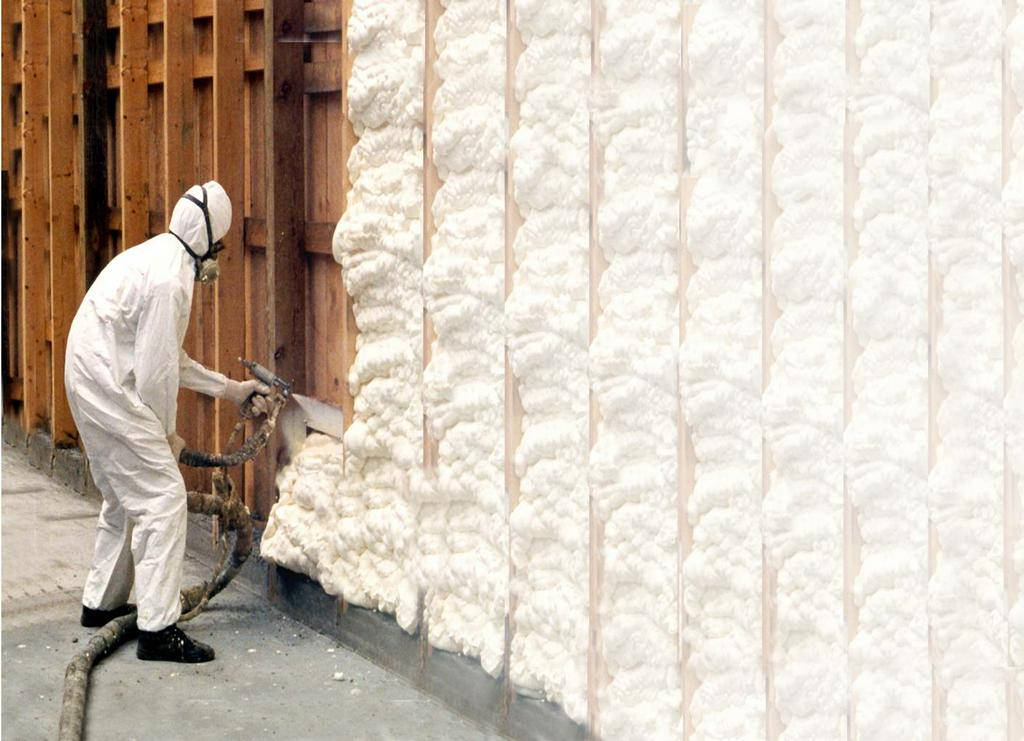Tips for Preserving Your Spray Foam Insulation for Long-Term Efficiency
Tips for Preserving Your Spray Foam Insulation for Long-Term Efficiency
Blog Article
Spray Foam: The Ultimate Option for Air Sealing and Insulation
Spray foam insulation has actually arised as a leading solution for reliable air sealing and thermal insulation, using an one-of-a-kind combination of residential or commercial properties that set it apart from traditional approaches. Comprehending the full range of its benefits, installation procedures, and contrasts with various other insulation kinds is critical for making notified choices.
What Is Spray Foam?
Spray foam is a flexible insulation material that combines the concepts of air sealing and thermal resistance to improve energy efficiency in buildings. Composed largely of polyurethane or various other comparable substances, spray foam is applied as a fluid that expands upon contact with surfaces, creating a solid, constant layer of insulation. This unique home allows it to load voids, splits, and voids that conventional insulation materials may forget, providing an exceptional air seal.
There are two main kinds of spray foam: open-cell and closed-cell. Open-cell spray foam is lighter and more versatile, using exceptional noise absorption and a reduced R-value per inch - Spray Foam. On the other hand, closed-cell spray foam is denser, offering a higher R-value, moisture resistance, and included structural honesty to constructing elements
The application process normally includes customized devices, making certain a smooth application that complies with various substratums, including steel, wood, and concrete. This adaptability makes spray foam suitable for both new buildings and retrofitting existing frameworks. Its capacity to create an airtight barrier dramatically adds to lowering power intake and boosting indoor air quality, consequently making it a recommended choice among homeowners and home builders alike.
Benefits of Spray Foam Insulation
One of one of the most significant benefits of spray foam insulation is its extraordinary capacity to produce a constant air barrier, which efficiently minimizes energy loss. Unlike traditional insulation materials, spray foam expands to fill gaps and fractures, making sure that air leak is drastically minimized. This particular not only boosts power efficiency but likewise brings about lower utility bills over time.
In addition, spray foam insulation supplies premium thermal resistance, adding to an extra stable interior environment. Its high R-value per inch allows for reliable insulation in confined rooms, making it perfect for attic rooms, wall surfaces, and crawl spaces. Additionally, the moisture-resistant residential properties of spray foam help stop mold and mildew development, promoting much healthier living conditions.
One more vital benefit of spray foam insulation is its sound-dampening high qualities (Spray Foam). It efficiently reduces noise transmission in between areas, developing a quieter and much more comfortable home atmosphere. The toughness of spray foam likewise attracts attention, as it does not droop or work out over time, preserving its performance throughout its life-span
Just How Spray Foam Works
Recognizing exactly how spray foam insulation works is crucial for appreciating its efficiency in air securing and thermal resistance. Spray foam insulation consists of 2 key elements: isocyanate and polyol material. When these components are mixed, they undertake a chain reaction that causes the material to increase swiftly, creating a thick foam that loads fractures, gaps, and tooth cavities.
As the foam expands, it sticks to surfaces, developing a closed seal that dramatically decreases air infiltration. This particular makes spray foam insulation highly efficient at avoiding drafts and wetness penetration, which can bring about energy loss and damages with time. In addition, the closed-cell version of spray foam uses superior thermal resistance as a result of its rigid structure, properly decreasing warm transfer.
The special residential properties of spray foam permit it to comply with irregular surfaces, ensuring extensive insurance coverage and a seamless obstacle. Because of this, spray foam insulation not just enhances energy effectiveness however also adds to boosted indoor air high quality by reducing the build-up of allergens and pollutants. Inevitably, recognizing the auto mechanics behind spray foam underscores its role as an exceptional choice for insulation and air sealing in both industrial and residential applications.
Installment Process Overview

Prior to installation, the space must be properly cleaned and prepped, guaranteeing that surfaces are devoid of moisture, particles, and dust. This step is important since contaminants can jeopardize attachment and total performance. As soon as the area is prepared, the application includes blending both components of the spray foam, which expands upon contact and fills up try this web-site gaps efficiently.
Trained experts ought to conduct the installment, making use of customized tools to ensure uniform protection and ideal thickness. Safety precautions, consisting of wearing safety gear and making certain appropriate ventilation, are important during this process. After application, the foam generally treatments swiftly, developing a strong obstacle that improves power efficiency.
Comparing Spray Foam to Conventional Insulation
When reviewing insulation alternatives, spray foam insulation stands out in comparison to typical materials such as fiberglass and cellulose. Among the main advantages of spray foam is its remarkable air sealing capacities. Unlike fiberglass and cellulose, which can enable air seepage, spray foam expands upon application, loading gaps and gaps to develop an impermeable seal. This causes boosted energy performance, as much less heated or cooled down air leaves the home, leading to reduced utility expenses.
Additionally, spray foam supplies a greater R-value per inch than conventional insulation types, providing even more efficient thermal resistance in a thinner account. This particular is particularly advantageous in spaces with limited tooth cavity depth. Furthermore, spray foam is resistant to wetness and mold and mildew growth, which can be a substantial interest in cellulose and fiberglass, especially in moist settings.
However, spray foam insulation commonly carries a higher in advance price than its standard equivalents. House owners need to weigh this first investment against lasting energy financial savings and performance advantages. Eventually, while both insulation kinds serve their function, spray foam becomes a more advanced service for contemporary insulation needs, especially in terms of air securing and thermal efficiency.

Final Thought
In recap, spray foam insulation stands for a very effective remedy for attaining optimal air securing and thermal resistance. Its special buildings, including moisture resistance and sound dampening, make it ideal for various applications in both new constructions and retrofitting projects (Spray Foam). The preliminary prices may be greater compared to typical insulation materials, the long-lasting benefits, such as substantial energy financial savings and enhanced interior air high quality, warrant the financial investment and highlight its worth in modern building techniques.
Spray foam insulation has continue reading this actually emerged as a leading solution for reliable air sealing and thermal insulation, offering an one-of-a-kind mix of buildings that establish it apart from standard techniques.Spray foam is a functional insulation material that integrates the principles of air securing find out this here and thermal resistance to boost power effectiveness in buildings.When reviewing insulation options, spray foam insulation stands out in comparison to traditional products such as fiberglass and cellulose. Inevitably, while both insulation types serve their objective, spray foam emerges as a more sophisticated service for modern insulation demands, particularly in terms of air sealing and thermal performance.
In summary, spray foam insulation stands for a very efficient remedy for achieving optimal air securing and thermal resistance.
Report this page